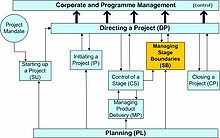Lessons learned - a tool for sharing knowledge in project management
Lessons learned is a cost-effective project management tool that aims to bring together any insight gained during a specific project, which can be usefully applied in future projects. [1]. According to Project Management Institute (PMI), project management is the application of knowledge, skills, tools and techniques to project activities in order to meet project requirements and objectives. [2]. The challenging task of managing projects can somewhat be aided through the usage of the tool, Lessons learned. Project Management Institute (PMI) defines lessons learned as the learning gained from the process of performing the project. [3].
Lessons learned is not a new term in the world of project management, but is however often a neglected one. The downsizing of the usage of lessons learned in projects seem conflicting with the importance of what can be gained from an effective lessons learned. An effective lessons Learned process should prevent the organisation from repeating its mistakes and allow it to repeat its successes. It should be an instrumental part of any organization’s overall continuous improvement” proces. [4]
The article ABSTRACT!!!!
Contents |
Overview
Introduction
Project management is becoming a more and more integral part of every organisation - spanning different countries, areas and sectors - in order to improve projects. Many organisations base their project management methods on the project management methodology, span class="plainlinks">PRINCE2</span>. PRINCE2 (PRojects In Controlled Environments, version 2) is a framework that provides guidelines that encompasses quality management, control and organisation of a project with consistency and review to align with project objectives. [5].
PRINCE2 is process-driven project management methodology, which builds on seven principles/processes that defines project management:

- Starting up project
- Initiating a project
- Directing a project
- Controlling a stage
- Managing product delivery
- Managing stage boudaries
- Closing a project
Projects are parts of organisations everywhere, anytime and occurs in different sizes, durations and complexity levels. Often, a lot of the work is focused on the initiating of the project as well as the execution of the project - however, at least as important is the closing of the project. The closing of a project concludes the project, the project should formally be
Knowledge sharing
Application
References
- ↑ [https://www.projectsmart.co.uk/lessons-learned.php] Project Smart, Last visited 13-09-2016
- ↑ Project Management Institute. (2008). A Guide to the Project Management Body of Knowledge. 4th Edition. p. 6. USA. ISBN 9781933890517
- ↑ http://www2a.cdc.gov/cdcup/library/pmg/implementation/ll_description.htm Project Management Institute, Project Management Body of Knowledge, Last visited 13-09-2016
- ↑ Westney Consulting Group 2014 Implementing an Effective Lessons Learned Process in a Global Project Environment. Mark Marlin PMP Sr. Vice President, Article. Available online here
- ↑ https://www.axelos.com/best-practice-solutions/prince2 PRINCE2 Official Website, Last visited 13-09-2016
- ↑ Wikipedia. The PRINCE2 Process Model. Last visited 13-09-2016